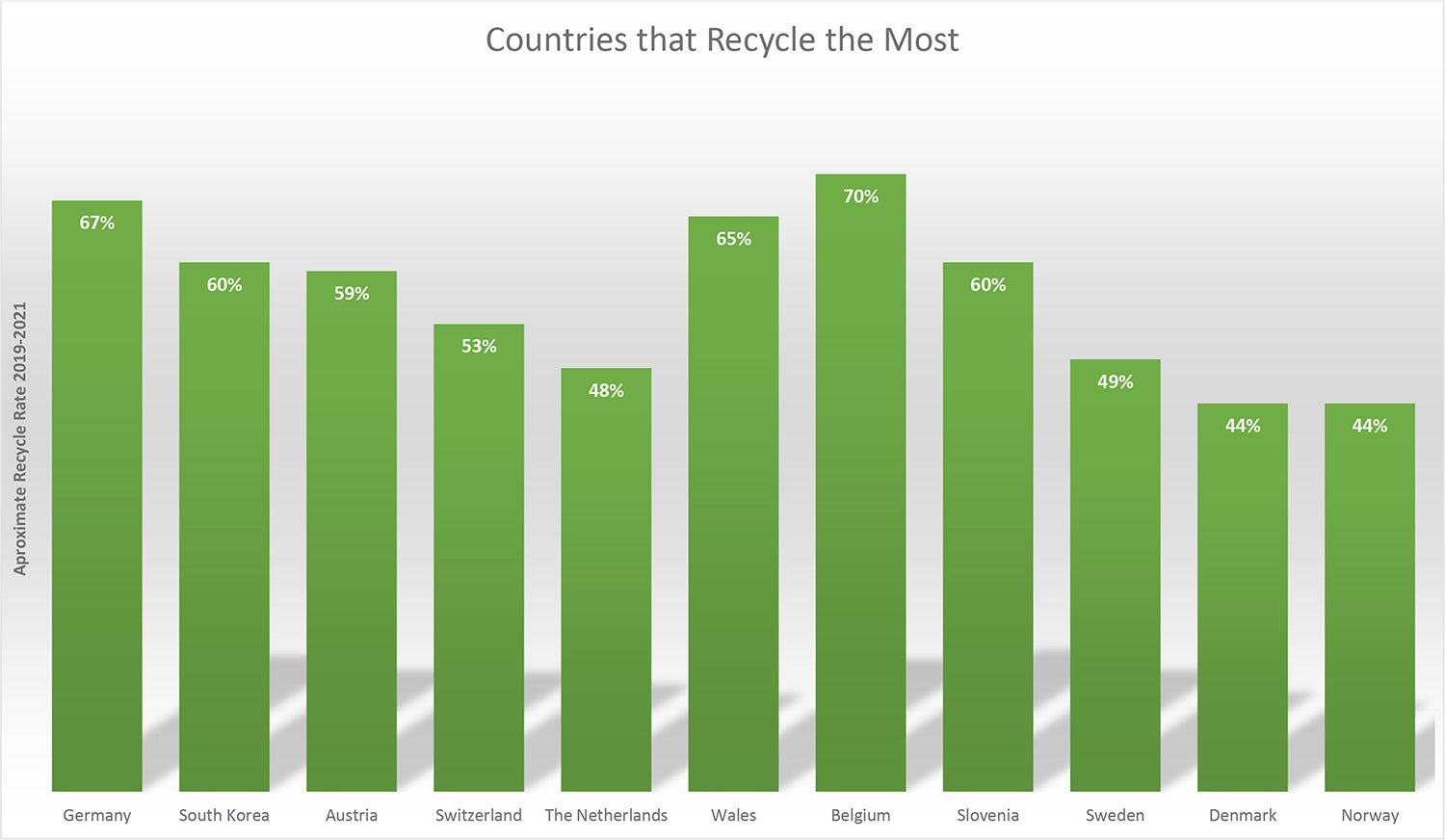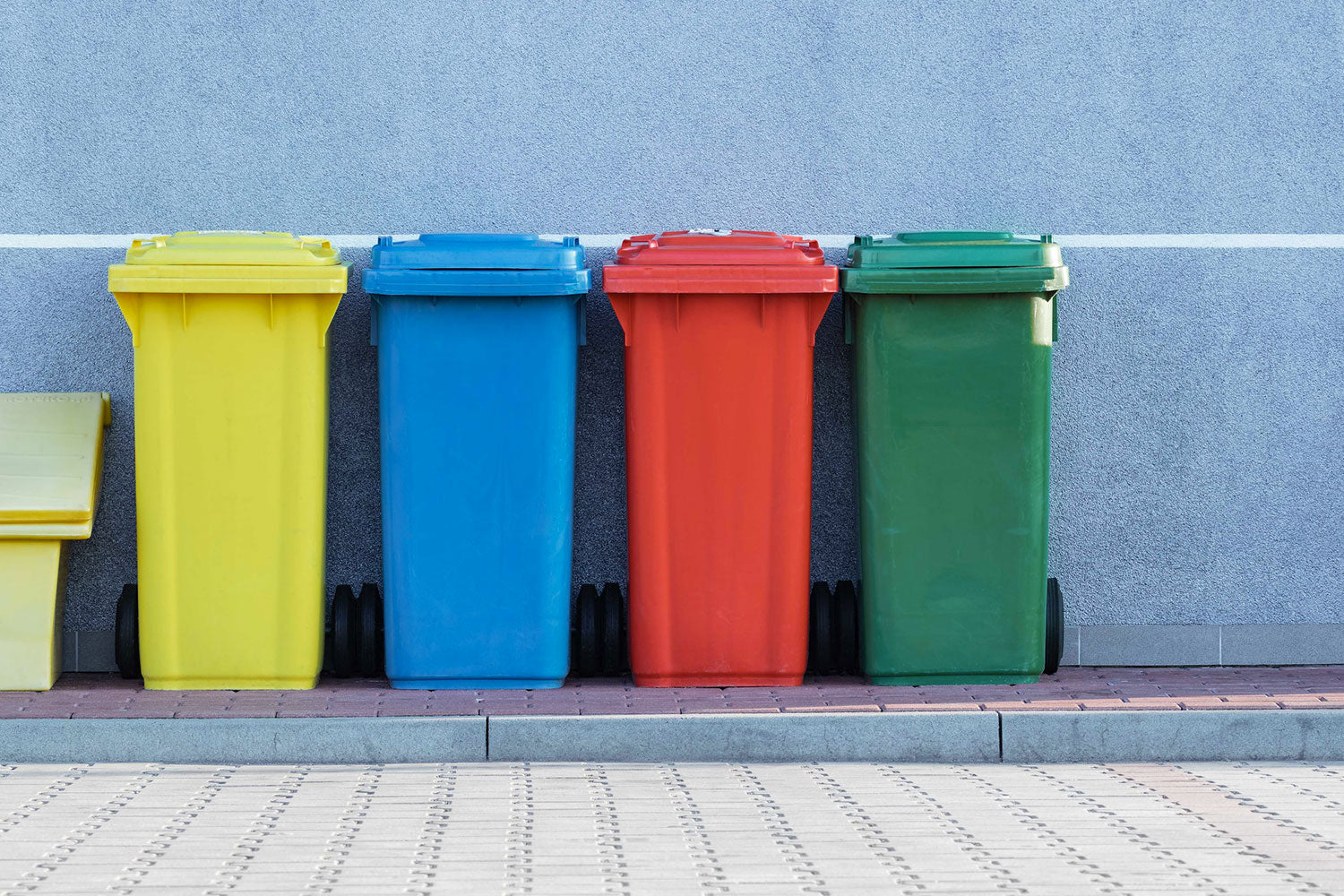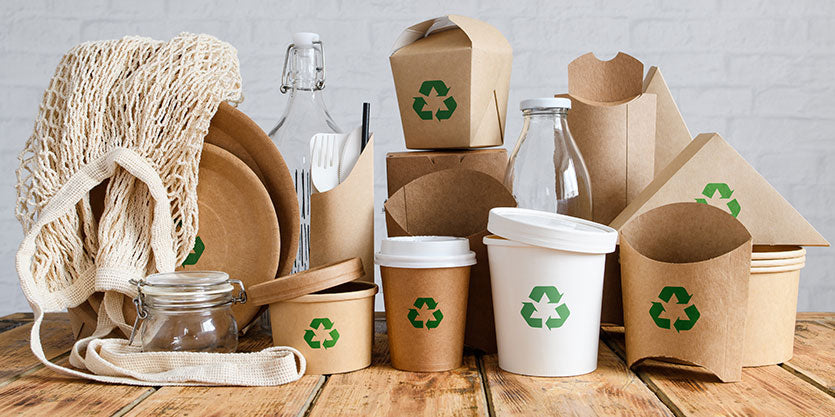Recycling is often perceived as a fancy trend that is known to have a positive impact on our environment. The common knowledge is that recycling is good for the environment, helps lower the risk of extreme global warming, and is beneficial to controlling waste and preserving Mother Nature.
However, there are many more important reasons why recycling is essential for our future on this planet. It's essential for us as a society to get to know the process and look up to countries that are world leaders regarding recycling and preserving our nature as much as possible. So, what countries recycle most, and will you be surprised by the current recycling tides? We thoroughly researched the subject and will gladly list recycling leaders below.
Quick Links
Recycling as a Concept
Before diving into statistics, it's important to understand recycling as a concept and get to know at least a part of its history with the right attitude.
The first recorded case of recycling (paper) was in Japan 9th century. Interestingly, recycling paper in Japan was closely related to its production, meaning that the Japanese people started recycling paper when they started producing it. Recycling became a part of the production process back when humans could not easily access other parts of the world besides their own reachable surroundings. The Japanese culture has continued to value recycled paper throughout human history. Another interesting fact regarding Japan is that in the 12th century, there was a case recorded of an empress recycling all letters and poems from her husband and writing a sutra on that recycled paper to wish peace upon his soul.
Fast forward to more modern times, or to be exact 1354, King Edward the Third invented rakers, people who were specifically hired to remove trash weekly. However, the trash they collected was thrown into the Thames River. The wish to maintain our nature has always been and will always be in our minds, meaning that we could work together with more guidance. Moreover, recycling isn't about specific benefits but one of the best ways of survival on this planet.
Nevertheless, 34 years later, in 1388, Britain successfully outlawed the disposal of any kind of waste in ditches and public waterways. Did you know that before the so-called modern era, recycling was a common practice in US, and before 1920, more than 70 percent of cities ran recycling programs?
List of Countries that Recycle the Most
According to the most popular websites for sustainability news and statistics, such as OECD Statistics and Eurostat, we conducted a list of countries that recycle the most.

1. Germany
Located in Europe, Germany has been the number one recycling country since 2016. Statista recently published a report stating that Germany recycled more than 67% of absolutely all municipal solid waste in 2020. The country has been able to reduce the total amount of waste produced, setting Germany as the number one recycler in the world.
How did Germany achieve this? Their very strict waste policies mean that companies are responsible for their packaging. After the products are sold, customers are responsible for properly disposing of the packaging implementing dual responsibility.
In addition, Germany also launched the Green Dot policy, stating that all the packaging needs to be marked and approved to use that mark.
These recycling schemes contributed to Germany being the recycling leader and a true role model.
2. South Korea
Moving out of Europe to Asia, South Korea had a 60 % recycling rate in 2020. South Korea banned colored PVC and plastic bottles by 2020. South Korea also pledged to reduce and eventually eliminate plastic straws and disposable cups by the end of 2027. Furthermore, in 2020, their environment ministry published a new policy to reduce all waste paper products while improving domestic recycling practices for plastic bottles.
In addition, South Korea's government has set a goal of collecting as many as 100000 plastic bottles per year beginning in 2022. South Korea has completely transformed its food waste practices which can be best seen when comparing the food waste recycling rate in 1995 (2%) to 2020 (95%).
The country achieved a 95% food waste recycling rate by implementing food waste fees in terms of households paying small monthly fees for every bag of biodegradable food debris.
3. Austria
Next on our list is Austria, located in the very heart of Europe. Austria doesn't waste time, and their recycling rate went up shortly after implementing a blanket ban on specific waste types going into trash yards.
In 2020, Austria's recycling rate reached a more than impressive 59%. The country has successfully banned all products that have a total organic carbon emission rate above 5%. Furthermore, from March 2020, all manufacturers in Austria were completely banned from selling or importing specific types of plastic bags. Not long after, in June 2020, retailers were banned from issuing these aforementioned plastic bags.
4. Switzerland
Switzerland has a very efficient and well-established waste management system that includes very strict regulations and policies regarding waste disposal. Their recycling practice revolves around “polluter payment," meaning that the recycling costs are pointed at producers and companies rather than the government and people. Switzerland's recycling practices are keen on separate collection and recycling of glass, aluminum, paper, electronic, and organic waste.
According to the latest data collected in 2021 by the Federal Office for the Environment (FOEN), which is responsible for the complete waste management in Switzerland, their overall recycling rate revolves around 53% making it one of the highest in the world.

5. The Netherlands
The Netherlands follows the European Union's circular economy goals referring to aiming to close resource loops and minimize all possible waste. The Dutch have developed an excellent waste management system emphasizing source separation, energy recovery, and recycling.
In addition, the country implemented ERP (extended producer's responsibility), again shifting the focus on producers instead of taxpayers and consumers. They have a very high-level separation practice.
According to Eurostat, their recycling rate for municipal waste was 56%, while in 2021, their overall recycling rate was 48%. The Netherlands' target of achieving a 65% recycling rate is set to be achieved by 2025.
6. Wales
Wales also accepted the ERP system while implementing regulations like The Welsh Government's Zero Waste Plan and Waste Measure 2010. By following these policies, their people are responsible for separating recyclable materials from non-recyclable materials while being provided with separate bags and bins for the purpose.
Wales has a very high level of separate collection systems for cardboard, paper, glass, metals, and plastics. The country is very advanced when it comes to food collection and recycling electrical and electronic equipment.
According to the latest data published by NRW (Natural Resources Wales), their overall recycling rate was 65.2%. However, Wales has set a very ambitious target to achieve a recycling rate of 70% by the end of 2025.
7. Belgium
Belgium is another country that has a very well-established recycling system with a high percentage of waste being recycled. The country has successfully implemented policies to promote numerous sustainable waste policies. According to Eurostat, Belgium’s recycling rate in 2019 was more than 60%. Today, their recycling rate is close to 70%. Belgium has also implemented circular economy policies ensuring waste minimization. With this policy, Belgium has ensured that valuable byproducts are reused and recovered.
The majority of the recycled materials in Belgium are upcycled, meaning that they are successfully transformed into new products with an even higher value than the original material. Furthermore, certain management practices in Belgium are climate-compensated, which means that the practices are designed to reduce the infamous greenhouse gas emissions.
8. Slovenia
Slovenia also has one of the highest recycling rates globally. According to Eurostat, Slovenia recycles more than 60% of its waste. They have implemented comprehensive waste management systems with a strong accent on reuse and waste reduction. Slovenia is another country that implemented circular economy policies while promoting sustainable consumption and production. Furthermore, Slovenia uses single-fraction collection systems, making it easier for people to recycle. Many products here are specifically designed to be home compostable.
9. Sweden
Sweden has had a strong recycling culture for quite some time, making the country one of the first recycling pioneers globally. According to Eurostat, in 2019, Sweden had a 49% recycling rate. The country is known for implementing policies that promote sustainable management of waste practices and promote reuse, recycling, and waste production. The majority of the waste products in Sweden are upcycled and recovered as there is a strong emphasis on circular economy policies.
10. Denmark
Moving on to Denmark, a country with a well-established recycling system and a high percentage of waste being recycled. Denmark has successfully implemented policies promoting sustainable waste management practices, including EPR programs. The country prioritizes reuse, waste reduction, and recycling. According to Eurostat, the recycling rate in Norway is 44%, which is more than remarkable. Many products are designed to be home-compostable, and Norway is working towards reducing greenhouse gas emissions.
11. Norway
Norway has an established reputation for being one of the most environmentally friendly countries globally. The country's advanced recycling system emphasizes sorting waste at the source, aka the households. Household waste is sorted into different categories before being collected. According to NEA (Norwegian Environmental Agency), about 60% of household waste is recycled, while the remaining 40% is used for energy recovery. Norway’s recycling rate in 2020 was about 48%, while it’s worth noting that this number includes energy recovery and material recycling.
As for active policies and regulations, the country has a strong deposit system for aluminum cans and plastic bottles, meaning that consumers pay a small fee when buying these items and are eligible to receive a refund when returning the items for recycling. Furthermore, Norway has banned all disposal of organic waste in landfills, thus promoting composting and every form of organic waste recycling.
In Short

Recycling isn’t some over complicated task that is new to our society. Recycling has always been present, and with some teamwork and proper education, we can contribute to a healthier environment and help our planet breathe again.
The concept of recycling should evolve into everyday life and it should be promoted now more than ever. We are proud to be the first in line of this fight by offering our customers a chance to replace the old with the new over our agood loop™ circular product concept. Our phone cases aren't just made from biodegradable materials — they're also designed to be returned through agood loop™. Simple return your old case to us and we will re-use it in future manufacturing.
However on the grand scale the best way for the world to dive into the matter is by following the footsteps of countries that successfully implement various regulations and policies. So, let’s work together and expand the list in the near future.






























